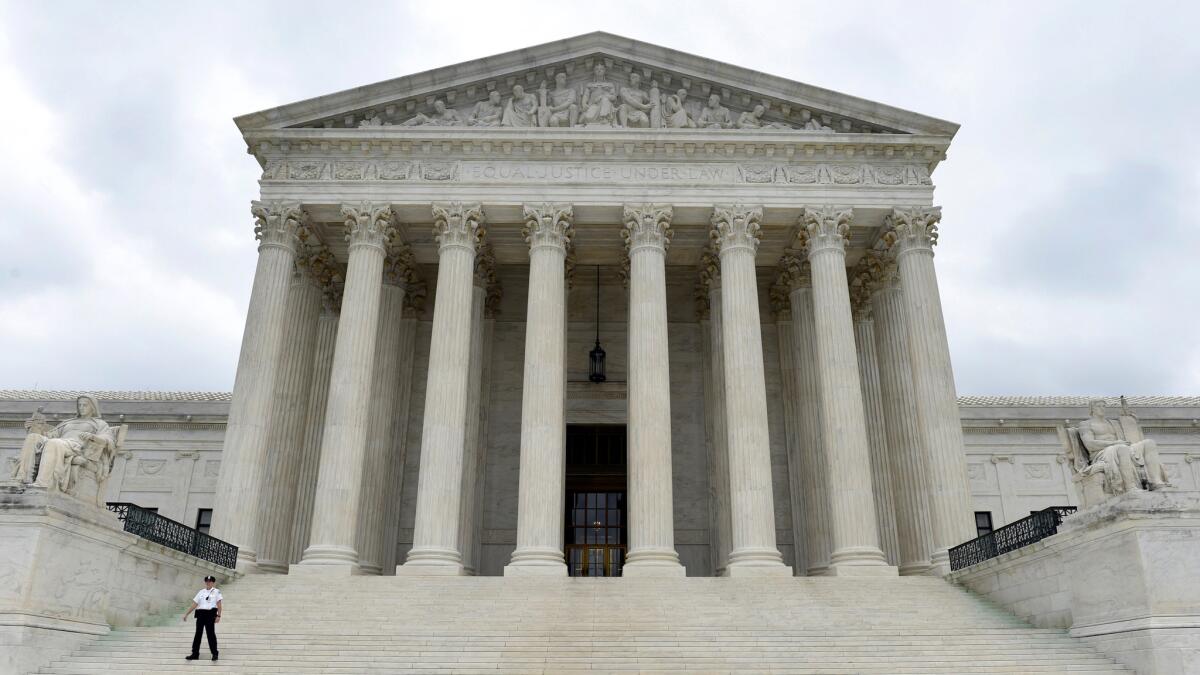Judges strike down partisan gerrymander in Wisconsin, likely sending issue to Supreme Court

- Share via
Reporting from Washington — The chances of a new Supreme Court challenge to partisan gerrymandering significantly increased Monday as federal judges in Wisconsin ruled the state’s Republican leaders had unconstitutionally drawn electoral districts to “entrench” their control over the state Assembly.
The state’s legislative districts had been drawn so meticulously to ensure partisan advantage that Republicans won overwhelming control of the house in 2012, with 60 of 99 seats, even though Democrats won 51% of the vote statewide, the judges noted.
The 2-1 decision from a three-judge federal district court panel marked the first time that federal judges have ruled a state’s electoral map was so one-sided as to deny voters from one party a voice in state government.
The judges said GOP leaders had drawn districts for the Legislature after the last census with the aim of preserving their majority for a decade almost regardless of what voters had to say. Republicans had control of the both houses of the state Legislature, and Gov. Scott Walker signed their election map into law.
“We conclude that the evidence establishes that one of the purposes (of the state map) was to secure Republican control of the Assembly under any likely future electoral scenario for the remainder of the decade, in other words to entrench the Republican Party in power,” wrote Judge Kenneth Ripple.
A group of 12 Democratic residents of Wisconsin had sued, contending the state plan deprived them of the right to have their voices heard on an equal basis. They did not claim the districts were drawn with squiggly lines or made for peculiar looking districts. Instead, they said GOP consultants had used software programs to draw an electoral map that ensured Republicans would win a majority of the seats, regardless of how the state’s voters split.
The case has been seen as potentially having a national impact because the losing side was almost certain to seek a ruling from the Supreme Court.
“This is a monumental victory for the plaintiffs in this case, but more importantly this is a historic moment for our nation and the betterment of democracy,” said Gerry Hebert, executive director of the Campaign Legal Center, which backed the plaintiffs. “With this decision, partisan gerrymandering should come to an end in Wisconsin and is now on its way to extinction across the nation.”
The judges did not say what Wisconsin must do to solve the problem. They asked both sides to submit briefs on a possible remedy.
The state’s lawyers can appeal to the U.S. Supreme Court.
In the past, the justices have been closely divided over claims of partisan gerrymandering. They have never struck down a state’s electoral map because it gave one party an unfair and overwhelming advantage over the other, although some justices have suggested the court might do so if the right case arose.
Twitter: DavidGSavage
ALSO:
Should it be legal to have a congressional district only one party can win?
Court disputes over voting laws often divide justices along party lines
The U.S. labor force’s guy problem: Lots of men don’t have a job and aren’t looking for one
More to Read
Sign up for Essential California
The most important California stories and recommendations in your inbox every morning.
You may occasionally receive promotional content from the Los Angeles Times.














